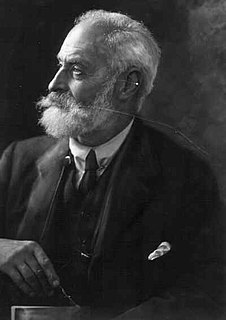
"Too Dear!" is a short story by Russian author Leo Tolstoy first published in 1897. It is a humorous account of the troubles of dealing with a criminal in the kingdom of Monaco.

"Too Dear!" is a short story by Russian author Leo Tolstoy first published in 1897. It is a humorous account of the troubles of dealing with a criminal in the kingdom of Monaco.

The Tolstoyan movement is a social movement based on the philosophical and religious views of Russian novelist Leo Tolstoy (1828–1910). Tolstoy's views were formed by rigorous study of the ministry of Jesus, particularly the Sermon on the Mount.
What is Art? is a book by Leo Tolstoy. It was completed in Russian in 1897 but first published in English due to difficulties with the Russian censors.

Aylmer Maude and Louise Maude (1855–1939) were English translators of Leo Tolstoy's works, and Aylmer Maude also wrote his friend Tolstoy's biography, The Life of Tolstoy. After living many years in Russia the Maudes spent the rest of their life in England translating Tolstoy's writing and promoting public interest in his work. Aylmer Maude was also involved in a number of early 20th century progressive and idealistic causes.

"The Three Questions" is a short story by Russian author Leo Tolstoy first published in 1885 as part of the collection What Men Live By, and Other Tales. The story takes the form of a parable, and it concerns a king who wants to find the answers to what he considers the three most important questions in life.
"Repentance" is a short story by Russian author Leo Tolstoy first published in 1886. The story details the difficulties of a repentant sinner's attempts to enter Heaven.
"Wisdom of Children" is a short story by Russian author Leo Tolstoy first published in 1885. It takes the form of a parable about forgiveness.
"The Grain" or "A Grain As Big As A Hen's Egg" is an 1886 short story by Leo Tolstoy about a king seeking to understand the properties of a grain he acquires.
"Work, Death, and Sickness", sometimes also translated as "The Right Way", is a short story by Russian author Leo Tolstoy written in 1903. The story takes the form of a parable about the creation of work, death, and sickness.
"The Devil" is a novella by Leo Tolstoy. It was written in 1889, given an alternative ending in 1909, but published only posthumously in 1911. Like Tolstoy's The Kreutzer Sonata, written around the same time, "The Devil" deals with the consequences of sexual emotion.
Polikúshka: The Lot of a Wicked Court Servant ("Поликушка") is a novella by Leo Tolstoy written in 1860 and first published in 1862. According to Tolstoy's translator, Aylmer Maude, it is the story of a serf who loses some money that belongs to his mistress before hanging himself.
"The Two Brothers and the Gold" is a short story by Leo Tolstoy written in 1885.
"Evil Allures, But Good Endures" is a short story by Leo Tolstoy written in 1885. It is commonly included in the massively-reproduced collection Twenty-three Tales.
"Two Hussars" is a novella by Leo Tolstoy published in 1856, and translated into English by Nathan Haskell Dole. This is a novel in which one generation struggles against an earlier generation, or Tolstoy's generation is in struggle against that of his fathers. Tolstoy translator Aylmer Maude describes the text as a "a rollicking tale with flashes of humor resembling Charles Lever's." Russian and Soviet literary scholar Boris Eikhenbaum has suggested that the introduction to Two Hussars was actually intended to be in The Decembrists, the incomplete novel that was supposed to be the following installment of War and Peace.
"The Port" is a short story by Guy de Maupassant written in 1889 and translated by Leo Tolstoy into Russian in 1891 as Françoise: A Story After Maupassant ("Франсуаза"). Other works by Maupaussant translated by Tolstoy include Too Dear!, which is often included in the popular collection of Tolstoy's work Twenty Three Tales.
"Walk in the Light While There is Light" is a short story by Leo Tolstoy written in 1893. According to famed Tolstoy-translators Louise Maude and Aylmer Maude, this story reflects Tolstoy's interest with early Christians, and according to translator Huntington Smith, this is a story about the early times of Christianity.
"The Coffee-House of Surat" is a short story by Leo Tolstoy written in 1891, first published in Russian in 1893, and first published in English in 1901. Like several other of Tolstoy's works, this work is based on a French piece translated by Tolstoy himself, by Jacques-Henri Bernardin de Saint-Pierre. Due to the censorship in Russia, Tolstoy had to adjust the tale somewhat.
"The Young Tsar" is a short story by Leo Tolstoy written in 1894. According to Tolstoy's diary, he recalled having titled it "The Dream of a Young Tsar". The introduction that prefaces the story is by Aylmer Maude.
"Posthumous Notes of the Hermit Fëdor Kuzmich" is a short story by Leo Tolstoy written in December, 1905, and then only published in 1912, over the ferocious objections of the tsarist censors and two years after Tolstoy's death. It was never completed.
"The Empty Drum: A Russian Folk Tale Retold by Leo Tolstoy" is a short story by Leo Tolstoy published in 1891. According to Aylmer Maude, famous Tolstoy translator, it was originally written in 1887, and is based on a folk story that reflects the Russian peasant's deep hatred of military service. It is based specifically on a folktale from the Volga region.
"Twenty-Three Tales" is a popular compilation of short stories by Leo Tolstoy. According to its publisher, Oxford University Press, the collection is about contemporary classes in Russia during Tolstoy's time, written in a brief, morality-tale style. It was translated to English by Louise Maude and Aylmer Maude
![]() Works related to Too Dear! at Wikisource
Works related to Too Dear! at Wikisource